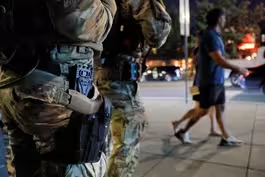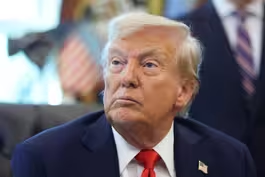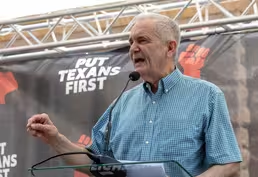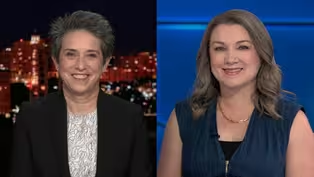
Is a bubble forming as AI investments drive economic growth?
Clip: 8/25/2025 | 7m 44sVideo has Closed Captions
Is a bubble forming as AI investments drive economic growth?
Tech companies are pumping hundreds of billions of dollars on infrastructure to ramp up artificial intelligence. Some projections show the spending may be fueling nearly half of this year’s estimated GDP growth. Economics correspondent Paul Solman looks at how AI is already impacting the economy, and whether a new risky bubble could be forming simultaneously.
Problems playing video? | Closed Captioning Feedback
Problems playing video? | Closed Captioning Feedback
Major corporate funding for the PBS News Hour is provided by BDO, BNSF, Consumer Cellular, American Cruise Lines, and Raymond James. Funding for the PBS NewsHour Weekend is provided by...

Is a bubble forming as AI investments drive economic growth?
Clip: 8/25/2025 | 7m 44sVideo has Closed Captions
Tech companies are pumping hundreds of billions of dollars on infrastructure to ramp up artificial intelligence. Some projections show the spending may be fueling nearly half of this year’s estimated GDP growth. Economics correspondent Paul Solman looks at how AI is already impacting the economy, and whether a new risky bubble could be forming simultaneously.
Problems playing video? | Closed Captioning Feedback
How to Watch PBS News Hour
PBS News Hour is available to stream on pbs.org and the free PBS App, available on iPhone, Apple TV, Android TV, Android smartphones, Amazon Fire TV, Amazon Fire Tablet, Roku, Samsung Smart TV, and Vizio.
Providing Support for PBS.org
Learn Moreabout PBS online sponsorshipAMNA NAWAZ: Tech companies are pumping hundreds of billions of dollars into infrastructure to ramp up artificial intelligence.
Some projections show that spending may be fueling nearly half of this year's estimated GDP growth.
A.I.
is having a disproportionate impact on the markets, too, especially in recent months.
Economics correspondent Paul Solman looks at how A.I.
is already impacting the economy and whether a new risky bubble could be forming at the same time.
PAUL SOLMAN: In red clay West Texas, one piece of a half-trillion-dollar bet, a ginormous data center complex from the folks who brought you ChatGPT, one of hundreds of A.I.
data centers sprouting nationwide, extravagant bets that, if they hit, could pay off big time.
VIVEK WADHWA, Tech Entrepreneur: Imagine going back to the days when electricity was first invented and making things happen 10 times faster.
We could now have automatic washing machines.
We could have refrigerators.
A lot of things became possible with electricity.
PAUL SOLMAN: A.I.
is the electricity revolution on steroids, says Silicon Valley entrepreneur and techno optimist Vivek Wadhwa.
VIVEK WADHWA: We're adding intelligence to everything and it's making our business processes smarter.
It's making data analysis for the government smarter.
Everything we do is becoming smarter because we have so much data and artificial intelligence helps us to understand that.
PAUL SOLMAN: You hear such starry-eyed enthusiasm from tech moguls far and wide.
DEAN CARIGNAN, A.I.
Innovation Lead, Microsoft: A.I.
can take away the drudgery of the work and allow the human to provide the things that only a person can do, creativity, innovation, coalition-building.
JOSEPH TSAI, Chair, Alibaba Group: We want to invest over 50 billion U.S. dollars in compute infrastructure and A.I.
SUNDAR PICHAI, CEO, Google: I think A.I.
is going to be bigger than the Internet.
PAUL SOLMAN: Which is why, since the release of the ubiquitous A.I.
ChatGPT in 2022, real and pledged spending by big tech has exploded.
ASWATH DAMODARAN, New York University: Right now, we're spending hundreds of billions of dollars on A.I.
architecture.
PAUL SOLMAN: Aswath Damodaran teaches finance at NYU's Business School.
ASWATH DAMODARAN: Why?
Because there is this hope, this prayer that there is this big market out there for A.I.
products and services.
PAUL SOLMAN: And just a prayer, say some folks.
JERRY KAPLAN, Stanford University: We're in the middle of an A.I.
bubble.
There is no need for dozens of companies to have what are called foundation models, and each of them are raising tens of billions of dollars in training these large so-called foundation models.
PAUL SOLMAN: The A.I.
boom reminds longtime A.I.
entrepreneur Jerry Kaplan of autos, dawn of the 20th century.
JERRY KAPLAN: There were dozens of car companies, eventually consolidated down to a few.
PAUL SOLMAN: And at the century's dusk: JERRY KAPLAN: There wasn't a need for dozens and dozens of browsers or search engines.
There's only a need for a small number.
We're in exactly that same situation today with respect to A.I.
There's only a need for a handful of the basic low-level foundation models to require all this investment to build.
So what's going to happen?
Well, it's all going to consolidate, obviously, and there will be only a few survivors left.
PAUL SOLMAN: So it's all a dream?
ASWATH DAMODARAN: There's this dream, at least, that maybe one day we can make money from selling A.I.
products and services.
Just as we overinvested for the Internet at the start of the dot-com boom, we overinvested in the P.C.
architecture business before the P.C.
boom, we overinvested in social media at the start of the social media boom, I think we're overestimating how much money can be made from A.I.
products and services.
PAUL SOLMAN: But, hey, he asks his classes: ASWATH DAMODARAN: What's so wrong with a bubble?
They said, bubbles are terrible.
They create pain.
People lose money.
I said, would you want to live in a world run by actuaries where it says, we'd still be in caves because they'd be looking at fire is a dangerous thing, let's have a few more thousand years of testing things out?
Every advance in humankind has come from overreaching.
PAUL SOLMAN: Yes, OK, but at what cost, if A.I.
is, at the moment, driving economic growth overall, estimates as high as 50 percent of GDP this year?
So that, if the bubble bursts, it'll be a real downturn for the U.S. economy.
ASWATH DAMODARAN: The real economy not that much, because if you think about the size of the real economy, even if you take all of the A.I.
architecture investments, it is a small percentage of a huge economy, but the market, very different story.
PAUL SOLMAN: The S&P 500, for example, is up 10 percent this year, largely thanks to tech stocks and investments in A.I.
ASWATH DAMODARAN: This is a market that has ridden on the back of A.I.
for the last couple of years.
The economy might do fine.
Stocks might be down 40 percent.
And that does have ripple effects in the economy.
I mean, losing $10 trillion in market cap just in five companies can have huge consequences for people's 401(k)s, their spending.
PAUL SOLMAN: Moreover, A.I.
's impact nearer term is proving way scary.
Many booming companies are not adding workers, as they usually do.
They're shedding them, both here and abroad.
SEBASTIAN SIEMIATKOWSKI, CEO, Klarna: The company have shrunk from about 5,000 to almost now 3,000 employees.
And if you go to LinkedIn and look at the jobs, you will see how we're shrinking.
PAUL SOLMAN: That was CEO of the hot buy-now, pay-later firm Klarna this spring.
Ten years ago, I did a story on coding academies.
It was the way to move up in the economy.
And now profitable companies, very profitable, are laying off those very people, no?
JERRY KAPLAN: I'm actually seeing that in microcosm in my work at Stanford.
A lot of the students are having considerable difficulty getting jobs.
And I'm talking about the students graduating with master's degrees in computer science.
That's a tremendous surprise for me.
I haven't seen that in my lifetime.
PAUL SOLMAN: And it's not just in techy Silicon Valley.
JIM FARLEY, CEO, Ford Motor Company: Artificial intelligence is going to replace literally half of all white-collar workers in the U.S. PAUL SOLMAN: That's Ford CEO Jim Farley in Rust Belt, Michigan.
JIM FARLEY: A.I.
will leave a lot of white-collar people behind.
PAUL SOLMAN: Other estimates are not quite as dire, but even as A.I.
displaces workers, it will improve the world immeasurably, Vivek Wadhwa is betting.
VIVEK WADHWA: My A.I.
can do what human beings can't do in analyzing patterns.
And, with it, I'm going to revolutionize the entire medical diagnostics industry.
My goal is to be able to provide full comprehensive medical testing for less than a cost of a meal.
PAUL SOLMAN: But even Wadhwa sees a downside he can't deny.
VIVEK WADHWA: A.I.
is going to take jobs on a scale that we haven't imagined before.
It's not that all jobs will disappear.
Many new jobs will appear.
But a lot of existing jobs that do grunt work, that do manual analysis of stuff, that do manual labor will be eliminated because of what A.I.
makes possible.
This is unstoppable.
PAUL SOLMAN: Unstoppable as A.I.
makes utopian dreams possible and dystopian dreams, well, at least as likely.
VIVEK WADHWA: I talk about its good side, the fact that I can use it now to solve the problem of the medical diagnostics, to help reduce suffering.
At the same time, it's going to take jobs away and create all sorts of new nightmares, security issues, deepfakes, God knows what.
None of us really understand how fast things are moving and where we're going to be even five years from now.
PAUL SOLMAN: And we're not even talking about rogue A.I.
that operates on its own, nightmare scenario of the "Terminator" movies, not talking about it in this story, anyway.
So, want a closing thought?
Mine may well be the same as yours.
The lord giveth and the lord taketh away.
For the "PBS News Hour," Paul Solman.
5 journalists killed after Israel strikes Gaza hospital
Video has Closed Captions
Clip: 8/25/2025 | 8m 10s | Another 5 journalists killed after Israel strikes Gaza's largest hospital (8m 10s)
Kilmar Abrego Garcia's attorney on new deportation effort
Video has Closed Captions
Clip: 8/25/2025 | 7m 7s | Kilmar Abrego Garcia's attorney discusses his case amid new deportation effort (7m 7s)
A look why presidents can control D.C.'s law enforcement
Video has Closed Captions
Clip: 8/25/2025 | 6m 55s | A look at D.C.'s unique history and why presidents can wield control of law enforcement (6m 55s)
News Wrap: Trump signs order aimed at flag burning
Video has Closed Captions
Clip: 8/25/2025 | 5m 13s | News Wrap: Trump signs order aimed at flag burning (5m 13s)
Rep. Doggett on redistricting and pushback against Trump
Video has Closed Captions
Clip: 8/25/2025 | 7m 12s | Democratic Rep. Doggett on Texas redistricting battle and party's pushback against Trump (7m 12s)
Tamara Keith and Amy Walter on Newsom's fight against Trump
Video has Closed Captions
Clip: 8/25/2025 | 9m 55s | Tamara Keith and Amy Walter on whether Newsom's tactics against Trump are working (9m 55s)
Providing Support for PBS.org
Learn Moreabout PBS online sponsorshipSupport for PBS provided by:
Major corporate funding for the PBS News Hour is provided by BDO, BNSF, Consumer Cellular, American Cruise Lines, and Raymond James. Funding for the PBS NewsHour Weekend is provided by...
















